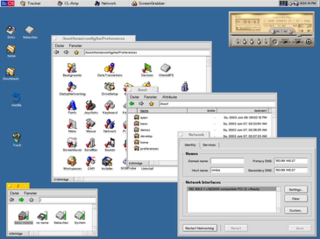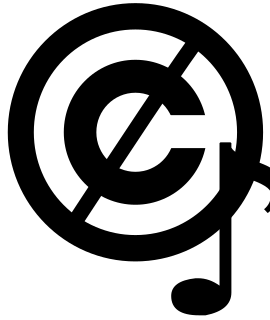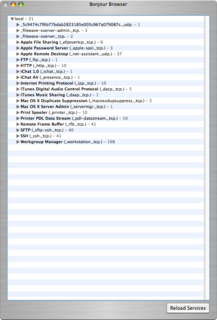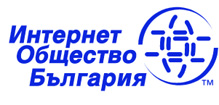
Bruce Perens is an American computer programmer and advocate in the free software movement. He created The Open Source Definition and published the first formal announcement and manifesto of open source. He co-founded the Open Source Initiative (OSI) with Eric S. Raymond. Today, he is a partner at OSS Capital.

BeOS is an operating system for personal computers first developed by Be Inc. in 1990. It was first written to run on BeBox hardware.

Free software is computer software distributed under terms that allow users to run the software for any purpose as well as to study, change, and distribute it and any adapted versions. Free software is a matter of liberty, not price; all users are legally free to do what they want with their copies of a free software regardless of how much is paid to obtain the program. Computer programs are deemed "free" if they give end-users ultimate control over the software and, subsequently, over their devices.
Freeware is software, most often proprietary, that is distributed at no monetary cost to the end user. There is no agreed-upon set of rights, license, or EULA that defines freeware unambiguously; every publisher defines its own rules for the freeware it offers. For instance, modification, redistribution by third parties, and reverse engineering are permitted by some publishers but prohibited by others. Unlike with free and open-source software, which are also often distributed free of charge, the source code for freeware is typically not made available. Freeware may be intended to benefit its producer by, for example, encouraging sales of a more capable version, as in the freemium and shareware business models.

GNU is an extensive collection of free software, which can be used as an operating system or can be used in parts with other operating systems. The use of the completed GNU tools led to the family of operating systems popularly known as Linux. Most of GNU is licensed under the GNU Project's own General Public License (GPL).
Creative Commons (CC) is an American non-profit organization and international network devoted to educational access and expanding the range of creative works available for others to build upon legally and to share. The organization has released several copyright licenses, known as Creative Commons licenses, free of charge to the public. These licenses allow authors of creative works to communicate which rights they reserve and which rights they waive for the benefit of recipients or other creators. An easy-to-understand one-page explanation of rights, with associated visual symbols, explains the specifics of each Creative Commons license. Creative Commons licenses do not replace copyright, but are based upon it. They replace individual negotiations for specific rights between copyright owner (licensor) and licensee, which are necessary under an "all rights reserved" copyright management, with a "some rights reserved" management employing standardized licenses for re-use cases where no commercial compensation is sought by the copyright owner.

Free music or libre music is music that, like free software, can freely be copied, distributed and modified for any purpose. Thus free music is either in the public domain or licensed under a free license by the artist or copyright holder themselves, often as a method of promotion. It does not mean that there should be no fee involved. The word free refers to freedom, not to price.

Bonjour is Apple's implementation of zero-configuration networking (zeroconf), a group of technologies that includes service discovery, address assignment, and hostname resolution. Bonjour locates devices such as printers, other computers, and the services that those devices offer on a local network using multicast Domain Name System (mDNS) service records.

The Free Software Foundation Europe (FSFE) is an eingetragener Verein under German law founded in 2001 to support all aspects of the free software movement in Europe, with registered chapters in several European countries. It is the European sister organization of the US-based Free Software Foundation (FSF). FSF and FSFE are financially and legally separate entities.

LinuxTag is a free software exposition with an emphasis on Linux, held annually in Germany. LinuxTag claims to be Europe's largest exhibition for "open source software" and aims to provide a comprehensive overview of the Linux and free software market, and to promote contacts between users and developers. LinuxTag is one of the world's most important events of this kind.

LinuxWorld Conference and Expo was a conference and trade show that focused on open source and Linux solutions in the information technology sector. It ran from 1998 to 2009, in venues around the world.

The free-culture movement is a social movement that promotes the freedom to distribute and modify the creative works of others in the form of free content or open content without compensation to, or the consent of, the work's original creators, by using the Internet and other forms of media.
An information commons is an information system, such as a physical library or online community, that exists to produce, conserve, and preserve information for current and future generations. Wikipedia could be considered to be an information commons to the extent that it produces and preserves information through current versions of articles and histories. Other examples of an information commons include Creative Commons.

Internet Society – Bulgaria is a non-governmental organization (NGO) for public benefit, founded on December 4, 1995, in Sofia by a group of Bulgarian Internet professionals.
In the 1950s and 1960s, computer operating software and compilers were delivered as a part of hardware purchases without separate fees. At the time, source code, the human-readable form of software, was generally distributed with the software providing the ability to fix bugs or add new functions. Universities were early adopters of computing technology. Many of the modifications developed by universities were openly shared, in keeping with the academic principles of sharing knowledge, and organizations sprung up to facilitate sharing. As large-scale operating systems matured, fewer organizations allowed modifications to the operating software, and eventually such operating systems were closed to modification. However, utilities and other added-function applications are still shared and new organizations have been formed to promote the sharing of software.

Free content, libre content, or free information is any kind of functional work, work of art, or other creative content that meets the definition of a free cultural work.

The Free Culture Forum (FCForum) is an international encounter of civic society actors on free culture, digital rights and access to knowledge. It has been taking place in Barcelona every year since 2009. It takes place jointly with the oXcars, a free culture festival.
The digital commons are a form of commons involving the distribution and communal ownership of informational resources and technology. Resources are typically designed to be used by the community by which they are created.
Open source is source code that is made freely available for possible modification and redistribution. Products include permission to use the source code, design documents, or content of the product. The open-source model is a decentralized software development model that encourages open collaboration. A main principle of open-source software development is peer production, with products such as source code, blueprints, and documentation freely available to the public. The open-source movement in software began as a response to the limitations of proprietary code. The model is used for projects such as in open-source appropriate technology, and open-source drug discovery.













